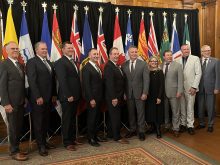An outbreak of neurotropic equine herpes virus-1 has spread from the United States to Canada.
Horses became infected at a cutting horse event in Utah held from late April to early May. Cases have arisen across the northwestern United States and in British Columbia and Alberta.
B.C. has seen three cases and Alberta has one confirmed case of the neurological strain of the disease. In all cases, the infected horses have been isolated and are recovering well. Two horses in Idaho have died.
Dr. Chris Clark of the Western College of Veterinary Medicine in Saskatoon says that equine herpes virus is common in horses.
Read Also

Canola support gets mixed response
A series of canola industry support measures announced by the federal government are being met with mixed reviews.
Infection often occurs within the first two years of a horse’s life. A portion of the virus lies dormant in nerve cells after symptoms subside and the disease can then break out if animals become stressed or if their immune systems are compromised.
This type of recurrence is similar to the virus that causes cold sores in humans.
In rare cases, as has happened with the recent outbreak, the virus spreads from the respiratory system into the blood stream, eventually collecting in the spine and causing the more severe neurological variant of the disease.
Neurotropic equine herpes virus is a slightly mutated form of the virus that carries a higher likelihood of attacking the nervous system, according to Dr. Gerald Hauer, chief provincial veterinarian for Alberta.
This is the first time the strain has been reported in Alberta, but it has shown up in outbreaks elsewhere in the country, including Saskatchewan in 2008.
Clark echoed advice delivered in letters to veterinarians and horse owners by Hauer, urging horse owners to remain vigilant and practice good biosecurity.
Various cutting horse events have been cancelled as a precautionary measure.
Clark and Hauer both maintain that the situation appears to be well contained. Both encouraged concerned horse owners to consult their veterinarians to determine what, if any, extra measures might be necessary.
Clark stressed that EHV-1 cannot be transmitted to humans.














